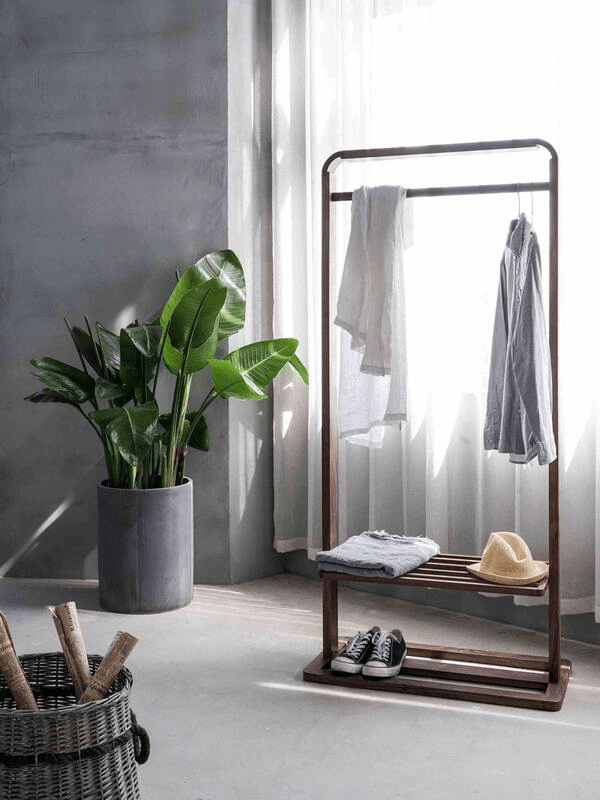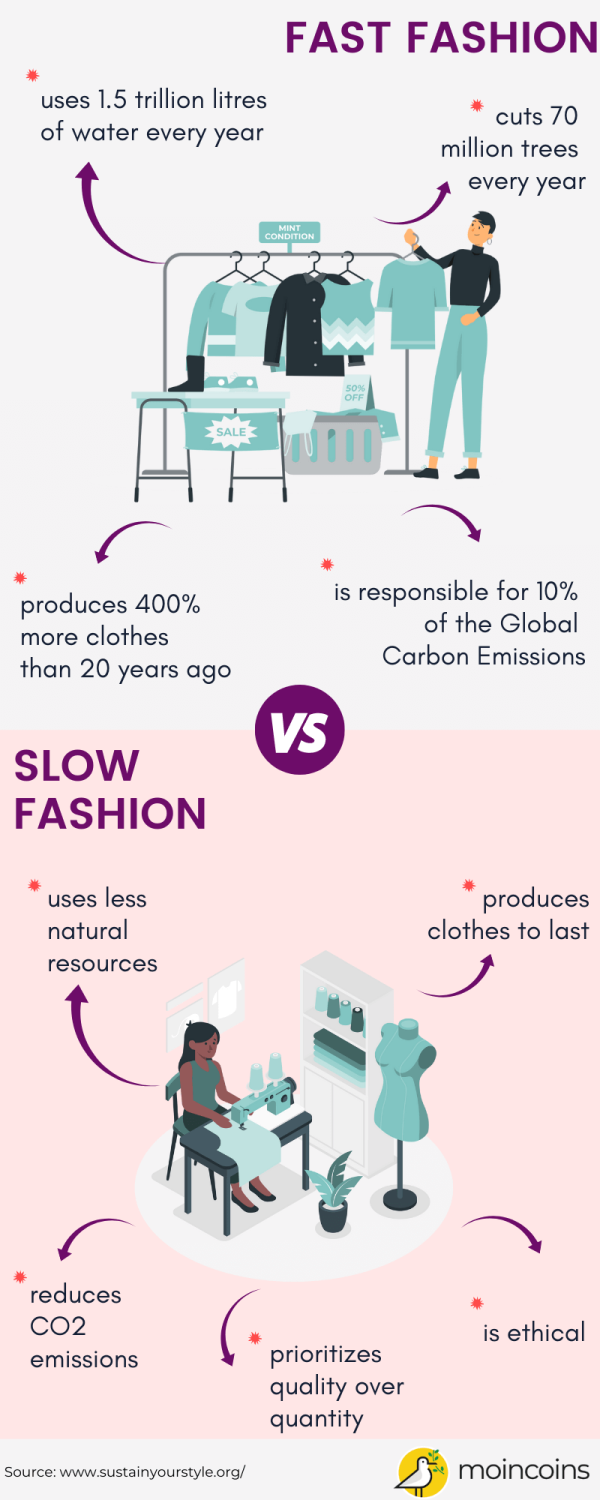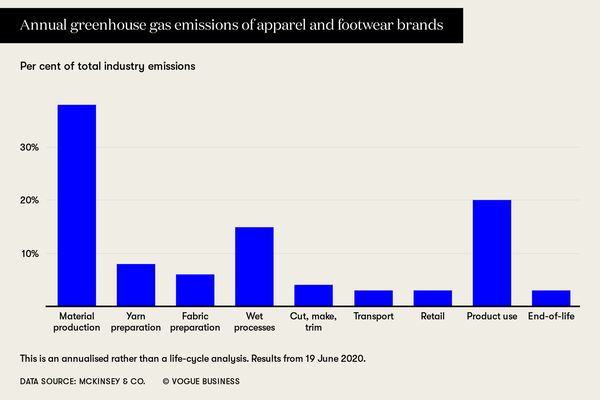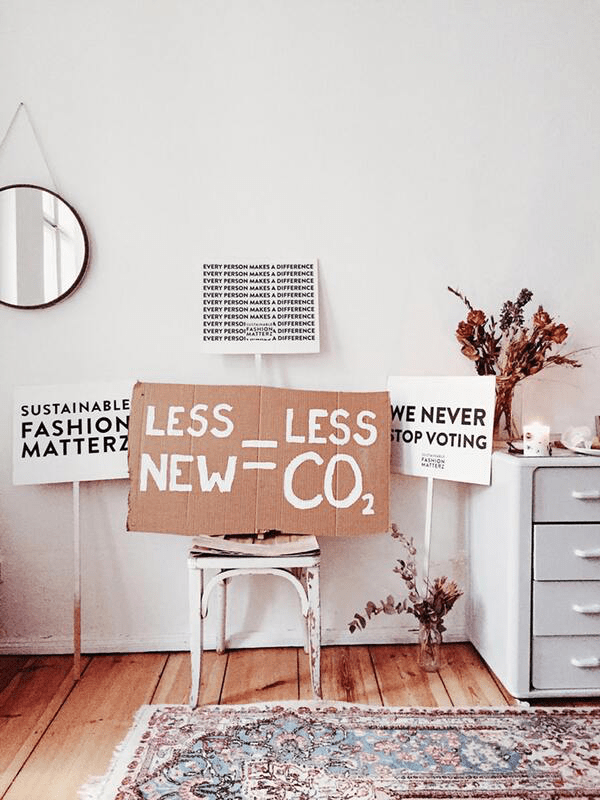Slow Fashion: Why It Matters and How to Support

Everything you need to know about slow fashion brands, why to shop and how to support this movement. We also recommend GRAMMAR for its astonishing and eco-friendly looks.
We include products we think can be useful for our readers. If you make a purchase through the links on this page, we may earn a small commission.
Good things take time, they say. This slogan is a good starting point to realize how far from that we are in our everyday choices. We’re constantly trying to figure out ways to get things done faster: modern technology, easy solutions to our problems, how to quickly fall asleep, fast dating, fast food, etc. But don't you think that life feels better when lived slowly? Eating is better when you’re slower, sex is better when you’re slower, making decisions is better when you’re slower, and even wine is better when it’s bottled for a longer time. The same happens with fashion! We’re here to explain to you what slow fashion is, why is it crucial for the fashion industry and how to join this movement.

Photo by tu tu via Unsplash
What Is Slow Fashion?
The term was invented in 2007, in an article by the author, design activist, and research professor Kate Fletcher in the British publication The Ecologist. It promotes a more ethical and sustainable way of living and consumption and it’s also sharp criticism of the fast fashion industry. This environmentally and socially conscious approach to fashion makes the consumers aware and more educated on the clothing manufacturing processes.
Slow fashion means:
- Clothes are made from sustainable materials
- Ethically manufactured clothes with fair working conditions
- High-quality clothes
- Fewer collections with garments that are more timeless than trendy
- Items are often sold in smaller or local stores rather than huge chain stores
- Clothing pieces are produced as made-to-order to reduce unnecessary production
- Transparency with labels.
Fast Fashion vs Slow Fashion
Unfortunately, fast fashion is still the industry norm - producing tons of garments, in as little time, effort and cost as possible. What characterizes fast fashion is cheap, easily accessible, speed-manufactured and shipped garments, with seasonal collections and up-to-the-minute styles. It is an industry that encourages a “throw-away” attitude and at the same time, it creates the need to buy something new.
According to a video about H&M’s recycling machines, the average American spends over $1,800 a year on new clothes and throws away 200 t-shirts' worth of textiles every year. In addition to that, we produce around 400% more clothes compared to the consumption rates 20 years ago. Fast fashion brands still use synthetic fibers like polyester, nylon, or acrylic which take hundreds of years to biodegrade. Slowing down seems to be the only solution.

Despite the fact that fast fashion has been widely criticized for low quality, bad working conditions and poor payments, exploitative practices and many more reasons, it’s also a matter of uniqueness. Most of the fast fashion brands face troubles on intellectual property grounds since many designers claim that their designs have been illegally duplicated and mass-produced by fast fashion companies. You already know how very possible it is to end up wearing what everyone else does. Slowing the process down and adding more quality and uniqueness is the only way out.
Why Shop Slow Fashion?
We presented the impact fast fashion has on the environment. If you're still unconvinced about choosing slow fashion instead, below are some extra arguments:
It will save you space
Shopping for classic, quality pieces that will last for years will create some space in your wardrobe and you will end up with fewer but more valuable clothing items.
You will develop a personal style
“Style is very personal. It has nothing to do with fashion. Fashion is over quickly. Style is forever.” - R.Lauren
By shopping for timeless, slow fashion pieces you will have the opportunity to become more creative, better express yourself, and develop a distinct personal style.
Fewer textiles will be thrown away
It’s a fact: the more clothes we have, the less we wear them, and the faster they end up in the bin. The average American has been estimated to throw away around 37kg of clothes every year. Additionally, it is estimated that by the year 2030, we are expected as a whole to be discarding more than 134 million tonnes of textiles a year.
You will reduce your carbon emissions
In this case, numbers speak for themselves. Recent research has shown that the global apparel and footwear industry produced more greenhouse gases than France, Germany and the UK combined in 2018 which equals 2.1 billion tonnes of CO2 emissions in total.
The best way to reduce your fashion carbon footprint when buying new items is to support slow fashion and sustainable brands that utilize materials made from natural or recycled fabrics and care about reducing their own waste throughout the supply chain.

Annual greenhouse gas emissions of apparel and footwear brands chart from Vogue Business
Cleaner water
Water is life. But in the case of fashion, tons of it are wasted if you think that a single pair of jeans takes around 1,800 gallons of water to be produced. What’s more, buying slow fashion not only saves water but ensures cleaner water too - synthetics are responsible for the enormous amounts of microfibers that end up in the ocean every year.
Support human rights
By switching to more ethical and sustainable brands, you can be sure that your clothing was produced under fair working conditions. In a world where most garments are produced under poor health conditions, exhausting working hours, and constant pressure, choose which side are you on.

Photo by Cherie Birkner via Unsplash
How to Support Slow Fashion?
- Buy only what’s necessary. Think about what you really need and what you would like to have.
- Value quality over quantity. It’s time to realize that you get what you pay for. Buying fewer but high-quality items is more important this year rather than having hundreds of garments that not only are but also look cheap.
- Buy all-time classic pieces. Invest in buying timeless pieces that will never lose their allure.
- Consider human rights before buying. Stand for fair trade conditions, fair payments and respect for workers around the world.
- Actively read labels. Labels do mean something and are there to be read carefully in order to get all information about the products we intend to buy. Look for certifications and badges which prove that the brand has met certain ethical standards.
- Choose your fabrics wisely. Some fabrics are much more eco-friendly than others. Avoid nylon, polyester, or other synthetics. You will soon find out that many slow fashion brands offer clothes made from hemp, yulex or tencel, which are great natural and eco-friendly alternatives for fabrics.
- Support small businesses. Very often creativity and innovation go hand-in-hand with small, local entrepreneurs, who design their clothes beyond the mainstream framework of trends. Supporting unknown designers that launch small collections with high-quality ethical standards will make you also a real innovator because you let your money do the talking for you.
- Repair instead of replacing. We're used to buying. Have you ever tried repurposing old pieces so they may continue to be worn? It's not only good for the planet but can also be a fun and adventurous process. Slow fashion advocates also support second-hand or vintage stores, since it also pitches in slowing the clothing production process.
Now that you’re into a more responsible way of thinking and hopefully consuming too, we give you our recommendation on where to shop for slow fashion.
GRAMMAR
Grammar is a sustainable and slow fashion brand, founded back in 2016, offering pieces that have a unique personality. It creates elegant, comfortable and timeless garments that stand up to the highest standards of design and sustainability. All materials are ethically sourced so the clothes are made from 100% organic cotton, which is also GOTS-certified (Global Organic Textile Standard). What’s more, this brand manufactures locally, reducing its carbon footprint and supporting local artisans and women- or minority-owned businesses in New York City.

The Agent Shirt from Grammar
Shopping at Grammar is not only eco-friendly but also a statement of elegance. Starting with foundational elements, like a white shirt, it creates a modern sophisticated wardrobe that every powerful woman would wish for. Each outfit is designed with honest respect for a woman’s form and with the passion to make her voice stronger.
It provides you with a great selection of 100% organic cotton white shirts that are the basic elements of your outfit as well as it also offers an expanded collection of dresses, tunics and accessories. All orders are shipped within 2 business days, right to your door at no additional shipping cost. You can also return your order within 30 days but we recommend you think about nature before placing your order to avoid growing your carbon footprint by sending items back. All garments are suggested to be washed in cold water, which is gentler on fabrics and conserves energy.